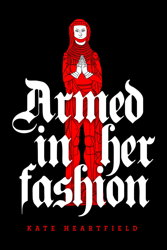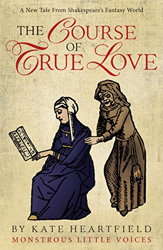
I’m in full on packing mode. The Nebula Awards Conference is this week. I’m actually heading there tomorrow because the SFWA Board has two full days of meetings to get through and so we’re starting a day early, and in order to start that bright and early Wednesday morning I need to drive there (Pittsburgh) on Tuesday. It should be a great week of planning for the next year, welcoming new members to the Board, seeing lots of old friends, meeting lots of new people, sneaking in time for some professional development, and celebrating some great fiction. And a few fortunate people will go home with lovely paperweights.
Out of deference to the Nebs, I won’t even pretend to offer you a segue to this week’s EATING AUTHORS guest and simply tell you that it’s the remarkable Kate Heartfield. She lives in rural Ottawa, teaches journalism at Carleton University, and has been a newspaper editor.
Kate’s first novel, Armed in Her Fashion, comes out in paperback tomorrow (the ebook came out last month). She’s also written an interactive novel, The Road to Canterbury for Choice of Games, and she has two time-travel novellas coming out soon from Tor.com. No stranger to history herself, she’s now on her way to making some.

LMS: Welcome, Kate. What was your most memorable meal?
KH: I don’t really remember what was in the soup. But eight years later, I can still see the covered dish it was in, on the light layer of snow on my front porch. I remember how it allowed me to believe that everything might be OK.
It was early February, in Ottawa, Canada. My partner and I had just come home from the hospital with our newborn boy.
The labour was long and difficult but without incident – until about an hour after the birth, when I complained about continued abdominal pain. My midwife’s smile vanished, and she said something along the lines of, “That’s not right.â€
It quickly became apparent how not-right it was. The pain got worse. My pulse went wild and I became very cold.
Post-partum hemorrhage is the leading cause of maternal mortality worldwide. I was lucky; I was in a very good hospital, where a surgeon saved my life.
But I’d lost two litres of blood, and had to stay in the hospital for a few days while the doctors monitored me and decided whether to give me a transfusion. They decided against the transfusion, but the blood loss left me severely anemic.
We humans use the iron in our food to make hemoglobin, which transports the oxygen from our lungs. Normal hemoglobin levels for someone with my body type are between 120 g/L and 160 g/L. Blood loss temporarily reduces hemoglobin, and it can take a while for our bodies to build it back up. Canadian Blood Services won’t take donations from people with levels lower than 125 g/L, because even that much of a drop from those levels could be dangerous.
As a long-time vegetarian, I was already aware of the importance of dietary iron. When I went into the hospital, my hemoglobin level was a healthy 157 g/L.
My hemoglobin level when I left the hospital with my newborn was 72 g/L.
In addition to the standard recovery issues after childbirth, the paucity of oxygen reaching my cells made me weak and confused. I had a few hallucinations, and could barely get out of bed at first. The worst of it, from my perspective, was that the hemorrhage delayed the onset of breast milk. I desperately wanted to nurse my baby, and I did, but it was a long, difficult and painful process to make it work.
When we arrived home to see that covered dish in the snow, with a little note about its origins, it was a sign that I had more support than I realized. I had friends who cared. Friends who lived in the city, but who made the 45-minute drive out to our rural home in February just to leave some soup on our porch.
We brought it into the kitchen, and lifted the lid. I wish I could remember the ingredients, but all I remember was realizing that (a) it was vegetarian and (b) it was full of iron-rich foods, like spinach, lentils, beans and chickpeas. My friends were thoughtful enough both to respect my vegetarianism and to make me food that would bring up my hemoglobin.
I ate it eagerly over the next few days. With the help of iron supplements and good food, my hemoglobin levels recovered in a few weeks – faster than my doctors had expected.
That humble vegetarian soup has stuck in my memory because it meant life for me (and for the hungry baby at my breast). My friends (who were then new parents themselves) left it for me in such a kind, quiet way that wouldn’t impose on me for anything, not even thanks or small talk. It was food without fuss. Food as offering. Food as help.
We writers who draw on medieval Europe for our settings often use a pottage of vegetables or perpetual stew — the pot sitting on the fire for days, with new scraps going in as needed — to signal humble surroundings. We might not think about the fact that humble or not, those nutrients allow our characters to fight, talk or think.
The main character in my novel Armed in Her Fashion is a wetnurse in medieval Bruges. In the opening scene, she sneaks out of a city under siege because she’s desperate to gather herbs she thinks might help her maintain her milk supply. I know exactly how she feels.

Thanks, Kate. What a generous and perfect gift. Soup is a miracle and a marvel in so many ways. And, by total coincidence, I just finished a novella about it. 🙂
Next Monday: Another author and another meal!
Want to never miss an installment of EATING AUTHORS?
Click this link and sign up for a weekly email to bring you here as soon as they post.
#SFWApro
Tags: Eating Authors


